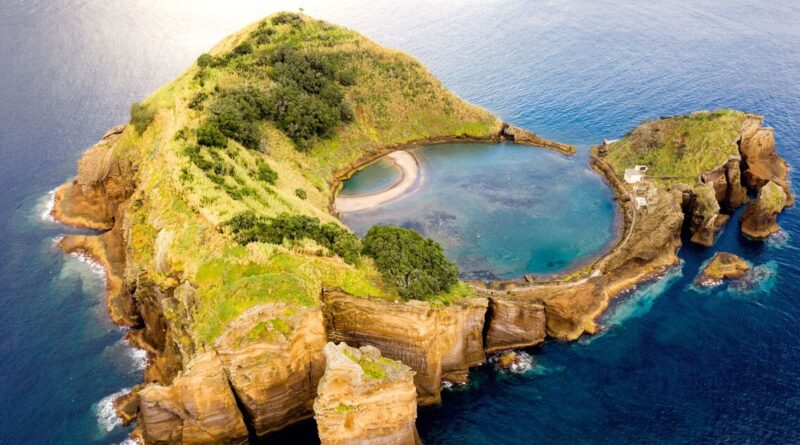The pretty little European island home to a perfect circle where tourists are often banned | World | News
A small, breathtaking European islet hosts a natural wonder – a lagoon shaped almost like a perfect circle. Just under a mile off the coast of São Miguel in the Portuguese archipelago of Azores lies Ilhéu de Vila Franca do Campo, a volcanic islet famed for its round lagoon, often called the “Princess Ring.”
This stunning natural pool was formed by the collapsed crater of an ancient submerged volcano. A narrow channel, known as the Boquete, links the lagoon to the sea, preventing rough ocean waves from disturbing its calm waters. The lagoon’s clear waters and a small sandy beach make it ideal for swimming, snorkelling and diving. Ilhéu de Vila Franca do Campo covers around six hectares (15 acres) and the highest point of the islet rises about 200 feet above sea level. The local Boquete channel wasn’t entirely natural. It was widened several centuries ago so that the lagoon could shelter boats in times of crisis, notably after the 1522 earthquake that devastated the nearby town.
The Portuguese islet boasts a rich history. In the late 16th century, it was involved in a naval conflict between Spanish and French forces. It also served as a prison and place of execution for captured French soldiers. Later, whalers inhabited its summit to assist in their hunts for sperm whales.
As a nature reserve, Vila Franca is closed outside the summer months (June through October). To protect the delicate flora and fauna, visitor numbers are limited – only 400 people per day and no more than 200 at any one time. Since 2005, boats have also been banned from entering the lagoon. A small port outside allows for preserving the water inside.
Within its crater walls, nine plant species that are endemic to the Azores thrive. The lagoon’s waters are home to about 24 species of coastal fish, including parrotfish, grouper, sheepshead (or dreamfish) and pufferfish. Fishing, plant removal and introducing non-native species are strictly forbidden.
Another of the islet’s most notable geological formations is the 105-foot volcanic stack called Farilhão, which is located off the islet’s southern end.
It’s also known as a venue for cliff-diving. In previous years, the Red Bull Cliff Diving World Series took place here, with divers leaping from heights of 27 metres (89ft) for men and 21 metres (69ft) for women.
Daily ferries operate during the summer months between Vila Franca do Campo and São Miguel. The fare stands at €10 (£8.40) for foreigners and €6 (£5) for residents.
“Ilhéu de Vila Franca is not only some beach of the Azores, nor just a Nature reserve. It is much more than that — a little paradise,” wrote Azores Adventures Futurismo.





